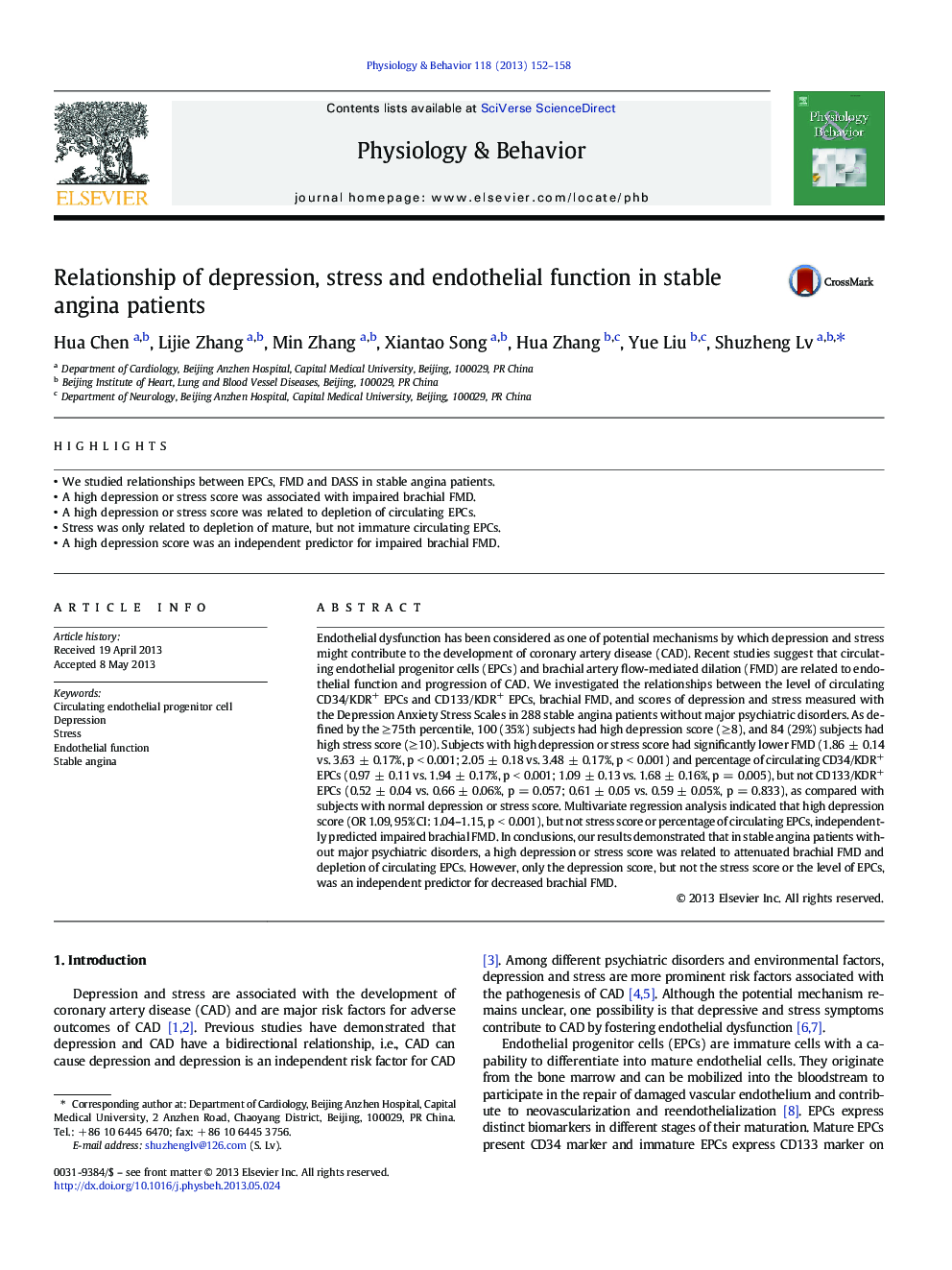| کد مقاله | کد نشریه | سال انتشار | مقاله انگلیسی | نسخه تمام متن |
|---|---|---|---|---|
| 5924720 | 1571199 | 2013 | 7 صفحه PDF | دانلود رایگان |
عنوان انگلیسی مقاله ISI
Relationship of depression, stress and endothelial function in stable angina patients
ترجمه فارسی عنوان
ارتباط افسردگی، استرس و عملکرد اندوتلیال در بیماران مبتلا به آنژین پایینی
دانلود مقاله + سفارش ترجمه
دانلود مقاله ISI انگلیسی
رایگان برای ایرانیان
کلمات کلیدی
سلول پیشگیرنده اندوتلیال گردش، افسردگی، فشار، عملکرد اندوتلیال، آنژین پایدار،
موضوعات مرتبط
علوم زیستی و بیوفناوری
بیوشیمی، ژنتیک و زیست شناسی مولکولی
فیزیولوژی
چکیده انگلیسی
Endothelial dysfunction has been considered as one of potential mechanisms by which depression and stress might contribute to the development of coronary artery disease (CAD). Recent studies suggest that circulating endothelial progenitor cells (EPCs) and brachial artery flow-mediated dilation (FMD) are related to endothelial function and progression of CAD. We investigated the relationships between the level of circulating CD34/KDR+ EPCs and CD133/KDR+ EPCs, brachial FMD, and scores of depression and stress measured with the Depression Anxiety Stress Scales in 288 stable angina patients without major psychiatric disorders. As defined by the â¥Â 75th percentile, 100 (35%) subjects had high depression score (â¥Â 8), and 84 (29%) subjects had high stress score (â¥Â 10). Subjects with high depression or stress score had significantly lower FMD (1.86 ± 0.14 vs. 3.63 ± 0.17%, p < 0.001; 2.05 ± 0.18 vs. 3.48 ± 0.17%, p < 0.001) and percentage of circulating CD34/KDR+ EPCs (0.97 ± 0.11 vs. 1.94 ± 0.17%, p < 0.001; 1.09 ± 0.13 vs. 1.68 ± 0.16%, p = 0.005), but not CD133/KDR+ EPCs (0.52 ± 0.04 vs. 0.66 ± 0.06%, p = 0.057; 0.61 ± 0.05 vs. 0.59 ± 0.05%, p = 0.833), as compared with subjects with normal depression or stress score. Multivariate regression analysis indicated that high depression score (OR 1.09, 95% CI: 1.04-1.15, p < 0.001), but not stress score or percentage of circulating EPCs, independently predicted impaired brachial FMD. In conclusions, our results demonstrated that in stable angina patients without major psychiatric disorders, a high depression or stress score was related to attenuated brachial FMD and depletion of circulating EPCs. However, only the depression score, but not the stress score or the level of EPCs, was an independent predictor for decreased brachial FMD.
ناشر
Database: Elsevier - ScienceDirect (ساینس دایرکت)
Journal: Physiology & Behavior - Volume 118, 13 June 2013, Pages 152-158
Journal: Physiology & Behavior - Volume 118, 13 June 2013, Pages 152-158
نویسندگان
Hua Chen, Lijie Zhang, Min Zhang, Xiantao Song, Hua Zhang, Yue Liu, Shuzheng Lv,
